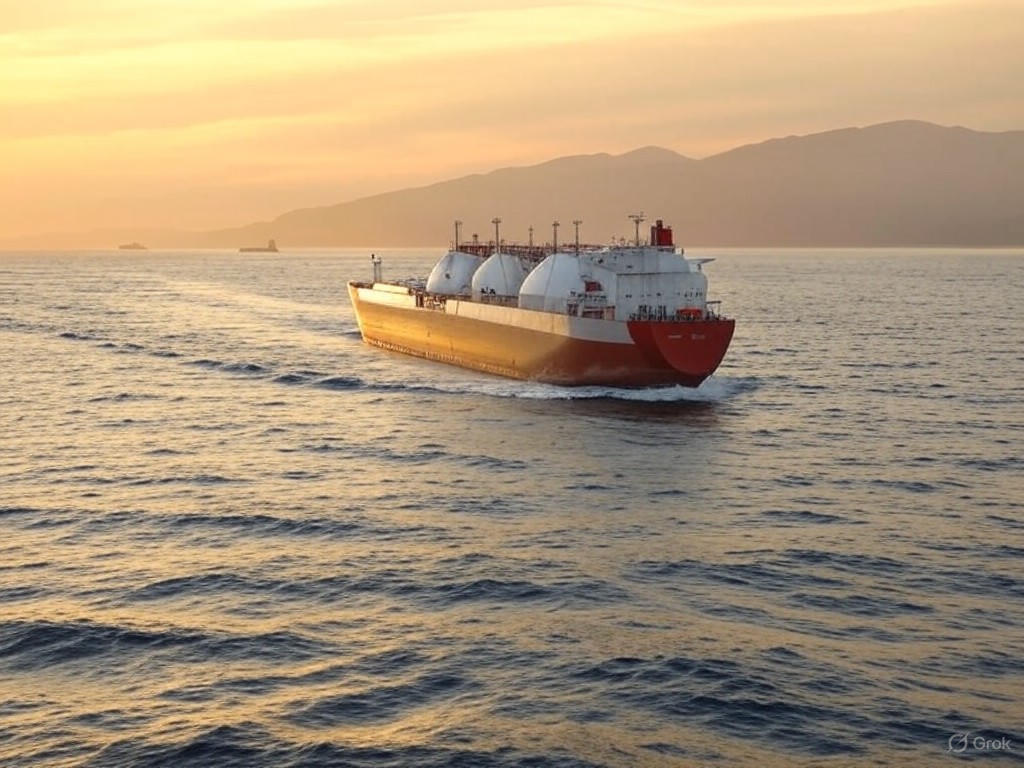BC’s LNG Exports: Countering US Trade Pressures with Asia
In the grand theater of international trade, where fortunes rise and fall like the tides of the mighty Pacific, British Columbia emerges as a shrewd protagonist. Amidst the clamor of global energy demands and the shadows of escalating trade tensions, the province's burgeoning liquefied natural gas (LNG) exports to Asia stand as a testament to strategic foresight and free-market resilience. This editorial explores how LNG Canada, the flagship project in British Columbia, positions Canada as a pivotal energy player, deftly countering U.S. trade pressures while navigating the choppy waters of environmental scrutiny. Through a lens of balanced analysis, we shall see that embracing free-market principles—fostering innovation and limited government intervention—offers a path to sustainable growth, all while upholding traditional values of energy security and economic sovereignty.

The expansive LNG Canada terminal in Kitimat, British Columbia, captures the province's ambitious infrastructure drive, linking North American resources to hungry Asian markets and symbolizing a new era of trans-Pacific energy trade.
The Strategic Chessboard: BC's Rise as a Global Energy Force
British Columbia's foray into LNG exports is nothing short of a masterstroke in the art of geopolitical maneuvering. At the heart of this strategy lies LNG Canada, a $40 billion joint venture spearheaded by industry giants like Shell and Petronas, which began operations in 2024. This project not only amplifies Canada's energy footprint but also serves as a bulwark against the unpredictable gusts of U.S. trade policies. As the United States wields tariffs and sanctions like a double-edged sword in its ongoing skirmishes—exemplified by the trade war with China—Canada finds itself at a crossroads. By pivoting toward Asia, particularly markets in Japan, South Korea, and China, BC leverages its vast natural gas reserves to forge independent trade lanes, reducing reliance on American dominance.
This free-market approach underscores the virtues of open commerce and private enterprise. Rather than succumbing to protectionist impulses, BC's strategy champions the flow of goods across borders, echoing the principles that have long fueled economic prosperity. According to a detailed analysis by the Wall Street Journal, Canada's LNG exports could reach 20 million tonnes per year by 2030, providing a vital counterbalance to U.S. pressures. This not only bolsters Canada's economy but also enhances regional stability, as Asian nations seek reliable energy sources amid their own industrial booms. In this narrative, government plays a supporting role—facilitating permits and infrastructure—while the private sector drives innovation, a model that honors traditional values of self-reliance and market-driven growth.
Yet, this ascent is not without its adversaries. Environmental scrutiny looms large, with critics decrying the potential for increased greenhouse gas emissions from LNG production and transport. Here, a center-right perspective urges caution against overzealous regulation that could stifle progress. By prioritizing efficient, market-based solutions—such as carbon capture technologies—BC can address these concerns without surrendering to bureaucratic excess.
Navigating Trade Winds: Countering U.S. Pressures and Embracing Free Markets
The intricacies of the trade war era demand a closer examination. Since the escalation of U.S.-China tensions under the Trump administration and their persistence into the Biden era, Canada has faced collateral damage, including tariffs on aluminum and softwood lumber. In this context, LNG exports to Asia represent a deft evasion maneuver, transforming potential vulnerabilities into opportunities. British Columbia, with its proximity to the Pacific and access to abundant shale gas from Alberta, is ideally positioned to supply Asia's voracious energy appetite. Projects like LNG Canada not only diversify Canada's export portfolio but also inject billions into the provincial economy, creating jobs and stimulating local industries.
From a free-market standpoint, this development exemplifies the benefits of limited government intervention. Instead of imposing heavy-handed regulations, policymakers in Ottawa and Victoria have wisely streamlined approvals, allowing private investors to lead the charge. As noted in a report by the Canadian Energy Centre, LNG Canada's operations could generate over $500 million annually in government revenues, funding public services without resorting to excessive taxation. This approach aligns with traditional values that prize individual initiative and economic freedom, steering clear of the pitfalls of overregulation that have hampered similar projects elsewhere.
However, the environmental lens adds complexity. Opponents point to the carbon footprint of LNG, arguing that its production contributes to global warming. Yet, a balanced view recognizes that LNG serves as a bridge fuel, offering a cleaner alternative to coal in Asia's power plants. Data from the International Energy Agency indicates that switching to natural gas could reduce CO2 emissions by up to 50% compared to coal, potentially averting millions of tonnes of pollutants. By investing in technological advancements rather than blanket bans, BC can mitigate these risks while maintaining its competitive edge.

A modern LNG tanker navigates the Pacific, embodying the high-stakes journey of British Columbia's exports to Asia and the delicate balance between economic ambition and ecological responsibility.
The Evidence at Hand: Weighing Benefits Against Scrutiny
To substantiate BC's emerging role, consider the empirical evidence. LNG Canada's first shipments to Asia in late 2024 marked a milestone, with contracts securing long-term deals that shield Canada from volatile U.S. trade dynamics. Economic projections from the Peterson Institute for International Economics suggest that these exports could add 1-2% to Canada's GDP growth by 2030, underscoring the fiscal windfall of free-market engagement. Meanwhile, environmental assessments, such as those conducted by British Columbia's government, reveal that the project incorporates advanced methane detection systems, curbing leaks that might otherwise exacerbate climate impacts.
Yet, the scrutiny persists. Indigenous communities and environmental groups have raised valid concerns about pipeline routes and habitat disruption, echoing broader debates on resource development. A center-right response advocates for dialogue and voluntary partnerships rather than mandates from above. For instance, LNG Canada has committed to reconciliation efforts with First Nations, integrating traditional knowledge into project planning—a nod to cultural stewardship without devolving into ideological overreach. This pragmatic path avoids the excesses of government overreach, focusing instead on mutual benefits that respect heritage while fueling progress.
In contrast, excessive intervention could mirror the regulatory quagmires that have delayed U.S. energy projects, as detailed in analyses from the American Enterprise Institute. By learning from these missteps, BC ensures that its LNG strategy remains agile, market-oriented, and responsive to real-world challenges.
A Vision of Resilient Prosperity: Charting the Course Ahead
As the curtain falls on this narrative, the story of British Columbia's LNG exports emerges as one of triumph through tenacity. By positioning itself as a reliable energy supplier to Asia, Canada not only counters U.S. trade pressures but also reaffirms the enduring power of free markets and limited government. LNG Canada stands as a beacon of innovation, where private enterprise meets global demand, all while addressing environmental concerns through practical, technology-driven solutions.
In an era of uncertainty, this strategy upholds traditional values—energy security, economic independence, and responsible stewardship—without succumbing to the whims of fleeting trends. Let us, then, applaud this bold gambit, for it reminds us that in the grand drama of nations, it is the steady hand of market forces that lights the way forward.

